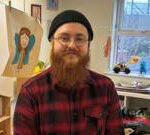BBC/Julia Quenzler
Sara’s uncle Faisal Malik, her stepmother Beinash Batool and her father Urfan Sharif all stood trial at the Old Bailey
On the morning of 13 November, four weeks into the murder trial of 10-year-old Sara Sharif, came a moment so dramatic it left jurors open-mouthed and an Old Bailey courtroom horrified.
Sara’s father Urfan Sharif had not long been in the witness box on the seventh day of giving evidence when suddenly, trembling, he uttered five words that would change the course of the trial.
“She died because of me.”
Until then, he had denied almost everything, instead blaming his wife – Sara’s stepmother – for her death. Now he was suddenly taking full responsibility for his daughter’s death.
It was the defining moment of an eight-week murder trial, which was disturbing and heart-breaking for jurors to sit through. They listened to horrifying details of Sara’s short, desperate life – the torture, the beatings, the injuries – and watched the courtroom drama of a husband and wife turning on each other.
Warning: This article contains descriptions of physical abuse
‘Too close for comfort’
The trial began just over a year after Sara was found dead in a bunkbed in her home – alone and abandoned by her family.
Inside the glass-panelled dock at London’s Old Bailey were the three people accused of her murder; Sara’s father, Urfan Sharif, her stepmother, Beinash Batool, and her uncle, Faisal Malik. They were separated by dock officers but were, I imagined, still too close for comfort.
“There is a head-on conflict brewing between the defendants,” prosecutor Bill Emlyn Jones KC said at the start of the trial.
Sharif was smartly dressed in a white collared shirt and black jacket. He was much thinner than in the pictures we had seen of him. Batool had gold-rimmed glasses on and wore a mustard jacket, with her hair tied back.
In the weeks they spent together in the dock not once did I see the two of them make eye contact. Most of the time they stared ahead. Sometimes they would look down at bundles of evidence.
On days Batool arrived first, her husband would have to walk within inches of her to get to his seat. They never turned to each other and they never spoke.
Both would often cry. The sounds of her sobbing would fill the courtroom. One day proceedings had to be suspended when Sharif, upset, walked out of the dock.
He would go on to brand his wife a “psycho” from the witness box, only to later take it back. One day she called out “liar” while he was giving evidence.
Listen to Helena Wilkinson read this articleOlga Domin
Sara suffered dozens of horrific injuries, the court heard
The first days of the trial were particularly shocking. Sara’s treatment had been brutal, the prosecutor said.
X-rays were put up on screens showing her fractured bones. Computer-generated images showed the extensive bruising over her body. “I’m afraid you may find even the graphical depictions upsetting,” the prosecutor told the jury.
Mr Emlyn Jones KC took us through the dozens of horrific injuries, both old and new – fractures and refractures, puncture wounds and abrasions, burns, blisters and bite marks.
Sara Sharif trial: Dad and stepmum found guilty of murderBehind Sara’s smile was a life of violence and torture’I hid Sara Sharif’s family during international police hunt’Smiles, songs and dreams of X FactorListen to the 999 call Urfan Sharif made to Surrey PoliceThere was an injury to Sara’s abdomen and a traumatic injury to her brain.
Just when we thought it could not get any worse there was more disturbing and sadistic evidence, that Sara had been hooded and repeatedly tied up or restrained. You could feel the lingering sense of horror in the courtroom.
In court, the prosecutor took us inside the house in Woking, Surrey, where Sara lived and where she was ultimately murdered.
BBC/Julia Quenzler
Prosecutor Bill Emlyn Jones KC described disturbing
Read More





